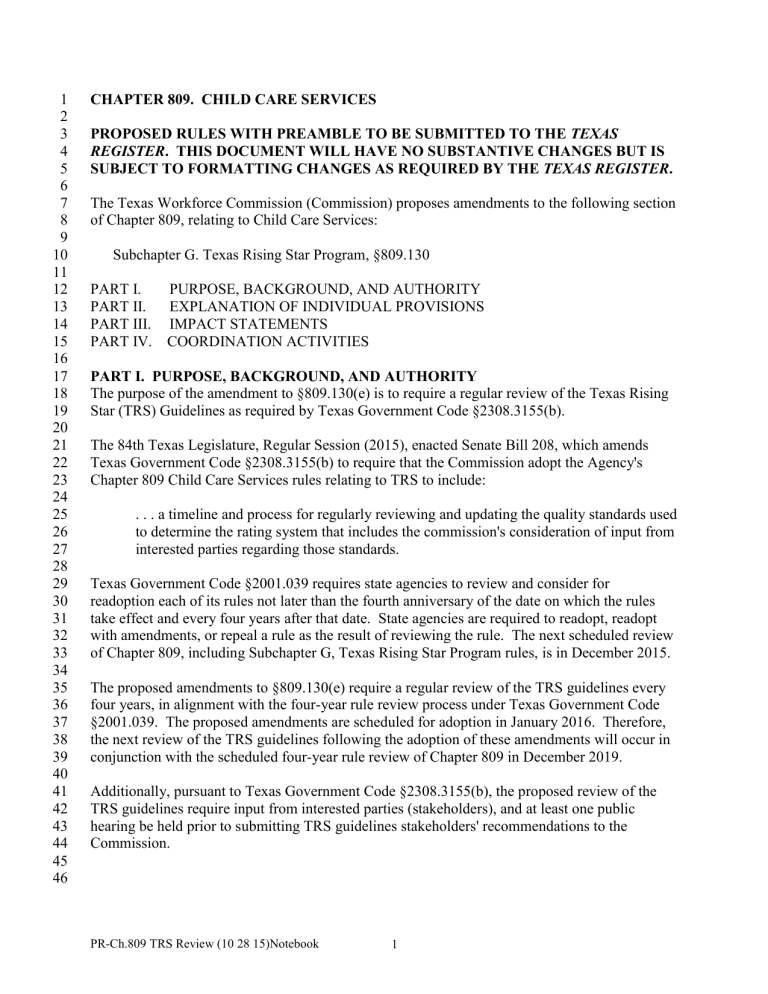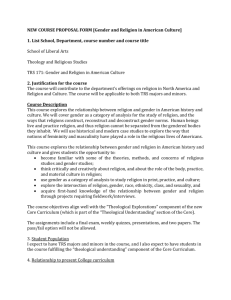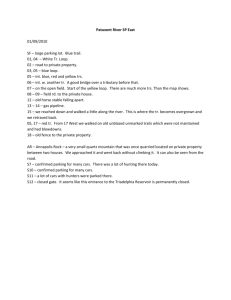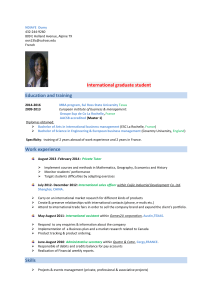Publication for Public Comment of Proposed Rules Relating to the

26
27
28
29
30
31
32
33
34
35
22
23
24
25
17
18
19
20
21
36
37
38
39
40
41
42
43
44
45
46
9
10
11
12
13
14
15
16
1
2
3
4
5
6
7
8
CHAPTER 809. CHILD CARE SERVICES
PROPOSED RULES WITH PREAMBLE TO BE SUBMITTED TO THE TEXAS
REGISTER. THIS DOCUMENT WILL HAVE NO SUBSTANTIVE CHANGES BUT IS
SUBJECT TO FORMATTING CHANGES AS REQUIRED BY THE TEXAS REGISTER.
The Texas Workforce Commission (Commission) proposes amendments to the following section of Chapter 809, relating to Child Care Services:
Subchapter G. Texas Rising Star Program, §809.130
PART I. PURPOSE, BACKGROUND, AND AUTHORITY
PART II. EXPLANATION OF INDIVIDUAL PROVISIONS
PART III. IMPACT STATEMENTS
PART IV. COORDINATION ACTIVITIES
PART I. PURPOSE, BACKGROUND, AND AUTHORITY
The purpose of the amendment to §809.130(e) is to require a regular review of the Texas Rising
Star (TRS) Guidelines as required by Texas Government Code §2308.3155(b).
The 84th Texas Legislature, Regular Session (2015), enacted Senate Bill 208, which amends
Texas Government Code §2308.3155(b) to require that the Commission adopt the Agency's
Chapter 809 Child Care Services rules relating to TRS to include:
. . . a timeline and process for regularly reviewing and updating the quality standards used to determine the rating system that includes the commission's consideration of input from interested parties regarding those standards.
Texas Government Code §2001.039 requires state agencies to review and consider for readoption each of its rules not later than the fourth anniversary of the date on which the rules take effect and every four years after that date. State agencies are required to readopt, readopt with amendments, or repeal a rule as the result of reviewing the rule. The next scheduled review of Chapter 809, including Subchapter G, Texas Rising Star Program rules, is in December 2015.
The proposed amendments to §809.130(e) require a regular review of the TRS guidelines every four years, in alignment with the four-year rule review process under Texas Government Code
§2001.039. The proposed amendments are scheduled for adoption in January 2016. Therefore, the next review of the TRS guidelines following the adoption of these amendments will occur in conjunction with the scheduled four-year rule review of Chapter 809 in December 2019.
Additionally, pursuant to Texas Government Code §2308.3155(b), the proposed review of the
TRS guidelines require input from interested parties (stakeholders), and at least one public hearing be held prior to submitting TRS guidelines stakeholders' recommendations to the
Commission.
PR-Ch.809 TRS Review (10 28 15)Notebook 1
36
37
38
39
40
41
42
43
44
45
46
26
27
28
29
30
31
32
33
34
35
21
22
23
24
25
9
10
11
6
7
8
1
2
3
4
5
12
13
14
15
16
17
18
19
20
PART II. EXPLANATION OF INDIVIDUAL PROVISIONS
(Note: Minor editorial changes are made that do not change the meaning of the rules and, therefore, are not discussed in the Explanation of Individual Provisions.)
SUBCHAPTER G. TEXAS RISING STAR PROGRAM
The Commission proposes the following amendments to Subchapter G:
§809.130. Short Title and Purpose
Amended §809.130(e) adds new paragraph (1) requiring that the Commission review and update the TRS guidelines at a minimum of every four years in conjunction with the rule review of
Chapter 809, conducted pursuant to Texas Government Code §2001.039.
Section 809.130(e)(1)(A) requires that the review and update consider input from stakeholders.
Section 809.130(e)(1)(B) requires at least one public hearing prior to submitting the stakeholder input to the Commission.
Section 809.130(e)(1) is renumbered as new §809.130(e)(2) without changes.
New §809.130(e)(2) is renumbered as new §809.130(e)(3) and amended to state that the
Commission may review and amend the TRS guidelines as necessary, provided that the amendments are adopted subject to the requirements of the Act.
PART III. IMPACT STATEMENTS
Randy Townsend, Chief Financial Officer, has determined that for each year of the first five years the rules will be in effect, the following statements will apply:
There are no additional estimated costs to the state and local governments expected as a result of enforcing or administering the rules.
There are no estimated cost reductions to the state and to local governments as a result of enforcing or administering the rules.
There are no estimated losses or increases in revenue to the state or to local governments as a result of enforcing or administering the rules.
There are no foreseeable implications relating to costs or revenue of the state or local governments as a result of enforcing or administering the rules.
There may be minimal economic costs to persons required to comply with the rules.
There may be minimal costs to stakeholders that give input on TRS guidelines as required by
§809.130(e)(1)(A), if the stakeholders incur travel, overtime compensation, or other costs for that purpose, or to participate in a public hearing held under §809.130(e)(1)(B). Stakeholder participation may involve state agencies, Boards, and child care providers, and could potentially include representatives from other organizations.
PR-Ch.809 TRS Review (10 28 15)Notebook 2
26
27
28
29
30
31
22
23
24
25
32
33
34
35
15
16
17
18
19
20
21
36
37
38
39
40
41
42
43
44
45
46
5
6
7
8
1
2
3
4
9
10
11
12
13
14
Costs, if any, incurred by stakeholders that are state agencies or Boards are not anticipated to create a net increase in total costs of those organizations; other stakeholders may experience minimal additional costs. The state legislature appropriates funds to the state for program administration. Similarly, Boards receive pass-through funds to administer programs locally.
State agencies and Boards can use these monies to fund costs of providing input on TRS guidelines. These monies are sum certain in amount, and it is assumed that the state and Boards would operate within those funding parameters. Therefore, it is estimated that costs, if any, that the state and Boards incur from providing input on TRS guidelines would not result in an increase to the total costs of those organizations. Other stakeholders may experience a minimal amount of additional costs.
We estimate that costs would be minimal in amount based on assumptions that stakeholder participation will ordinarily be for a limited duration every four years, will require limited or no travel, and will require limited, if any, other costs.
There is no anticipated adverse economic impact on small businesses or microbusinesses as a result of enforcing or administering the rules.
Economic Impact Statement and Regulatory Flexibility Analysis
The Agency has determined that the proposed rules will not have an adverse economic impact on small businesses, as these proposed rules place no requirements on small businesses, including child care providers.
Doyle Fuchs, Director of Labor Market and Career Information, has determined that there is no significant negative impact upon employment conditions in the state as a result of the rules.
Reagan Miller, Director, Workforce Development Division, has determined that for each year of the first five years the rules are in effect, the public benefit anticipated as a result of enforcing the proposed rules will be to ensure public and stakeholder input to the review and updating of the
TRS guidelines.
The Agency hereby certifies that the proposal has been reviewed by legal counsel and found to be within the Agency's legal authority to adopt.
PART IV. COORDINATION ACTIVITIES
In the development of these rules for publication and public comment, the Commission sought the involvement of Texas' 28 Boards. The Commission provided the concept paper regarding these rule amendments to the Boards for consideration and review on August 18, 2015. During the rulemaking process, the Commission considered all information gathered in order to develop rules that provide clear and concise direction to all parties involved.
Comments on the proposed rules may be submitted to TWC Policy Comments, Workforce
Policy and Service Delivery, attn: Workforce Editing, 101 East 15th Street, Room 440T, Austin,
Texas 78778; faxed to (512) 475-3577; or e-mailed to TWCPolicyComments@twc.state.tx.us
.
Comments must be received or postmarked no later than 30 days from the date this proposal is published in the Texas Register .
PR-Ch.809 TRS Review (10 28 15)Notebook 3
5
6
7
8
9
10
1
2
3
4
The rules are proposed under Texas Labor Code §301.0015 and §302.002(d), which provide the
Commission with the authority to adopt, amend, or repeal such rules as it deems necessary for the effective administration of Agency services and activities, and Texas Human Resources Code
§44.002, regarding Administrative Rules.
The proposed rules affect Texas Labor Code, Title 4, Chapters 301 and 302, as well as Texas
Government Code, Chapter 2308.
PR-Ch.809 TRS Review (10 28 15)Notebook 4
36
37
38
39
40
41
42
43
44
26
27
28
29
30
31
22
23
24
25
32
33
34
35
9
10
11
12
13
14
1
2
3
4
5
6
7
8
15
16
17
18
19
20
21
CHAPTER 809. CHILD CARE SERVICES
S UBCHAPTER G. TEXAS RISING STAR PROGRAM
§809.130. Short Title and Purpose.
(a) The rules contained in this subchapter may be cited as the TRS Program rules.
(b) The purpose of the TRS Program rules is to interpret and implement Texas
Government Code §2308.3155(b) requiring the Commission to establish rules to administer the TRS program, including guidelines for rating a child care provider for
TRS certification.
(c) The TRS Program rules identify the organizational structure and categories of, and the scoring factors that shall be included in, the TRS guidelines.
(d) The TRS guidelines for rating a child care provider shall:
(1) describe measures for the TRS program that contain, at a minimum, measures for child care providers regarding:
(A) director and staff qualifications and training;
(B) caregiver-child interactions;
(C) curriculum;
(D) nutrition and indoor and outdoor activities; and
(E) parent involvement and education;
(2) specify measures that:
(A) must be met in order for a provider to be certified at each star level; and
(B) are observed and have points awarded through on-site assessments; and
(3) specify the scoring methodology and scoring thresholds for each star level.
(e) The TRS guidelines:
PR-Ch.809 TRS Review (10 28 15)Notebook 5
9
10
11
5
6
7
8
1
2
3
4
12
13
14
15
(1) shall be reviewed and updated by the Commission at a minimum of every four years in conjunction with the rule review of Chapter 809, conducted pursuant to
Texas Government Code §2001.039, and the TRS guidelines review shall:
(A) consider input from stakeholders; and
(B) include at least one public hearing held prior to submitting the stakeholder input to the Commission;
(2) shall be adopted by the Commission subject to the requirements of the Texas
Open Meetings Act; and
(3) also may be reviewed and amended as determined necessary by the
Commission in accordance with the requirements of the Texas Open Meetings
Act.
PR-Ch.809 TRS Review (10 28 15)Notebook 6








